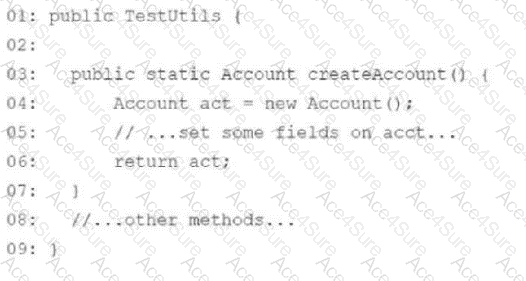To ensure that the TestUtils class and its methods are only accessible by unit test methods, the class must be annotated with the @isTest annotation. This annotation limits the scope of the class and its methods to test contexts only.
Why @isTest?
Purpose of @isTest:
The @isTest annotation marks a class or method for use exclusively within test scenarios. It prevents the methods from being accidentally invoked in production code.
This ensures better test isolation and prevents misuse.
Static Test Data Methods:
Marking helper methods for test data creation as @isTest ensures they do not interfere with production code and are strictly for testing purposes.
Analysis of Options:
Option A: @isTest above line 03:
Incorrect. Applying @isTest only to the createAccount method would work, but the other methods in the class would still be accessible. This does not satisfy the requirement of restricting the entire class.
Option B: Add @isTest above line 01:
Correct. Annotating the class ensures all methods within the class are accessible only in the context of tests.
Option C: Change public to private on line 01:
Incorrect. Changing the class to private would cause a compilation error, as top-level classes in Salesforce cannot be declared private.
Option D: Remove static from line 03:
Incorrect. Removing static does not affect the test scope of the class or its methods. Static methods can still be invoked, and this does not restrict access to test contexts.
Correct Implementation:
The corrected code would look like this:
@isTest
public class TestUtils {
public static Account createAccount() {
Account acct = new Account();
// Set some fields on acct
return acct;
}
// Other methods...
}
[References:, Apex Testing: Test Classes and Methods, Trailhead Module on Apex Testing, , , ]

